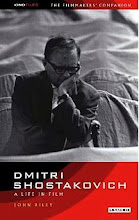Using the system of academy leader: 10 to 1, the film replaces the number to white space with bip sound (clear leader) gradually until it reaches complete white.
Could it be that simple? When the film started, my heart sank – yes it could. It seemed we were in for the filmic equivalent of strict process music or total serialism. The creator makes a set of decisions and then sets it all in train like a line of tumbling dominoes. But not so entertaining.
Of course the artist's abdication of ongoing control can lead to embarrassments like the unintentional chord of A minor that turns up in the middle of one of Stockhausen’s Klavierstücke. Oh, how we laughed at the irony…
But for me, once the system is understood, it rather negates the actual experience. The apex is possibly James Tenney’s unlistenable August Harp in which the unfortunate soloist (and listener) endure 43 grinding minutes, arpeggiating at an unchanging trudge through every possible permutation of a diatonic tetrachord, altered by use of the pedals (I’ll save you the effort: there are – count ‘em – 81). An all too representative sample is here. Tenney’s own exertions were somewhat milder as he simply wrote the instructions on the back of a post card, doubtless driving the benighted recipient literally ‘postal’.
Anyway, back to the darkened NFT. It seemed that we’d be subjected to the same sort of artistic waterboarding: the visual count down – 10, 9 (+ 1 white), 8(+2 white)… etc all the way to 1(+ 9 white) and then back up to 10 accompanied only by the intermittent blip and the hiss and pop of the track.
I confess I quickly did some mental arithmetic. Thank God, only 200 seconds.
 But then – wasn’t there a missing number? An eye-slip or a knackered print? But the moment had gone. Slowly, other ‘anomalies’ appeared and the sequence began increasingly to short circuit and loop back on itself. So we went from 8 to 4 or from 3 to 7, and the sense of 10-1 being a irreducible series was paradoxically intensified and weakened as it was first broken and then reconstructed. In our heads invisible strings linked the new, artificial series, the criss-crossing creating an elegant mental cat’s cradle.
But then – wasn’t there a missing number? An eye-slip or a knackered print? But the moment had gone. Slowly, other ‘anomalies’ appeared and the sequence began increasingly to short circuit and loop back on itself. So we went from 8 to 4 or from 3 to 7, and the sense of 10-1 being a irreducible series was paradoxically intensified and weakened as it was first broken and then reconstructed. In our heads invisible strings linked the new, artificial series, the criss-crossing creating an elegant mental cat’s cradle.A dreaded 200 seconds mysteriously became an enchanting twelve minutes. Iimura's underselling the film.



